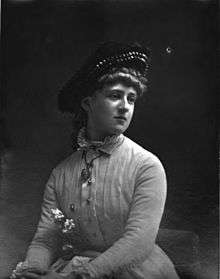Elizabeth Hawkins-Whitshed

Elizabeth Hawkins-Whitshed (1860 – 27 July 1934), usually known after her third marriage as Mrs Aubrey Le Blond and to her climbing friends as Lizzie Le Blond, was a Irish pioneer of mountaineering in a time when it was almost unheard of for a woman to climb mountains. She was also an author and a photographer of mountain scenery.[1]
She came from an upper-class background, being the daughter of Captain Sir St Vincent Hawkins-Whitshed, 3rd Baronet (1837–71) (see Hawkins-Whitshed baronets) by his wife Anne Alicia (née Handcock) (1837–1908), and further back was descended from the aristocratic Bentinck family, and was therefore related to the Dukes of Portland.
She grew up in Greystones, County Wicklow in the south-east of Ireland, where her father owned quite a bit of land. However, her father then died, leaving no other children, while she was still a minor, and the Lord Chancellor took her on as his ward.
Elizabeth moved to Switzerland, where she climbed mountains in her skirt. In 1907, she took the lead in forming the Ladies' Alpine Club and became its first president. She wrote seven books on mountain climbing and over her lifetime made twenty first ascents, conquering peaks that no one had climbed before.
As Mrs Aubrey Le Blond she made at least ten films of alpine activities in the Engadine Valley of Switzerland, including ice hockey at St Moritz and tobogganing on the Cresta Run. She is probably among the world's first three female film-makers, after Alice Guy and contemporary with Laura Bayley. Her films were shown by James Williamson at Hove Town Hall in November 1900, being included in his catalogue in 1902, and were praised by the film pioneer Cecil Hepworth and the writer E. F. Benson.
She married three times: firstly, in 1879, to Frederick Gustavus Burnaby (1842–1885); secondly, in 1886, to John Frederick Main (died 1892); and thirdly, in 1900, to Francis Bernard Aubrey Le Blond. From her first marriage, she had a son Harry Burnaby, in 1880. Despite her second and third marriages, the lands at Greystones that she had inherited from her father (before marriage) were to be known as the Burnaby Estate. This part of Greystones (The Burnaby) was developed after 1900. It includes Burnaby Road, Somerby Road, as well as Whitshed, St. Vincent's, and Portland Roads, and Hawkins Lane. She published accounts of her climbing under the names Mrs. Fred Burnaby, Mrs. Main, and Mrs. Aubrey Le Blond.
She published her autobiography Day In, Day Out in 1928.
References
- Brief biography of "Miss Main" – in German
- History of Greystones in County Wicklow – with information on the Burnaby Estate and the Hawkins-Whitshed family
- Descendants of Willem Bentinck and Charlotte Sophie of Aldenburg by Hein Bruins – source for family information
- Peter H. Hansen, ‘Le Blond , Elizabeth Alice Frances (1860–1934)’, Oxford Dictionary of National Biography, Oxford University Press, September 2004; online edn, October 2006